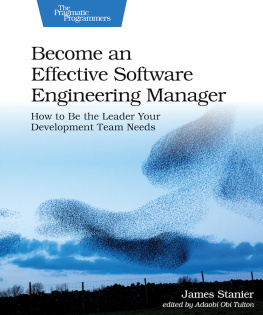What Managers Do
Fourth Edition
What Managers Do
Fourth Edition
William R. Allen
Harold L. Gilmore

1993, 1988 American Management Association. 1978, 1971 Education for Management, Inc. All rights reserved. This material may not be reproduced, stored in a retrieval system, or transmitted in whole or in part, in any form or by any means, electronic, mechanical photocopying, recording, or otherwise, without the prior written permission of the publisher.
Printed in the United States of America
Contents
About This Course
As one course among many offered in our curriculum, What Managers Do has been designed specifically for the practicing manager and the future manager. It provides private, self-paced, individualized study; learning and self-evaluation through in-text exercises; and communication between the student and our staff of instructors through case studies and a final examination. Paralleling a business school course of study, our curriculum makes available a stable, inclusive, and continuing transmittal of practices and perspectives to those working managers who, on their own time and at their own pace, want to continue their education.
William R. Allen is a consultant to business and government and President of William R. Allen Associates, a consulting firm specializing in management education, development, and evaluation. He has extensive management and supervisory experience and he is currently associate professor of management at the University of Massachusetts, Dartmouth. He is a highly regarded leader of professional development seminars, workshops, and programs for all levels of management. He has written two books, Explorations in Management and Social Forces and the Manager, and articles for numerous journals, including Journal of Applied Psychology and The Journal of Plant and Facilities Management and Engineering. Dr. Allen holds a B.S. from the U.S. Coast Guard Academy and an M.B.A. and Ph.D. from the University of Florida.
Harold L. Gilmore has extensive international experience, as well as industrial and public service with Westinghouse Electric Corporation, Avco Corporation, and the Department of Defense. As a Fulbright Scholar, he lectured in Zambia, India, and Ethiopia, and he held an endowed chair at the University of Technology in Compeigne, France. He is currently Professor of Management at the University of Massachusetts, Dartmouth, and at St. Johns University, Queens. He is the author/coauthor of numerous articles and a book on product testing and evaluation service quality. He is a Fellow of the American Society for Quality Control and a member of the Academy of Management, Production/Operations Management Society, and the Institute of Electrical and Electronics Engineers, Inc. Dr. Gilmore received his Ph.D. from Syracuse University.
The publisher wishes to thank Professor Vicki LaFarge, Department of Management, Bentley College, and Professor Janice C. Sipior, Department of Management, Villanova University, for their help in reviewing the manuscript of this course.
How to Take This Course
This course consists of text material for you to read and four types of learning activities (the review questions, the first examination, the practice case, and the examination case* or, in some cases, a multiple-choice final examination) for you to complete. Credit will be given only upon successful completion of the examination case or, if applicable, the final examination.
*If you are viewing this book digitally, you cannot send in your response for credit as a course. If you wish to receive credit for taking this course and want to send in a response to this assignment, please purchase a hard copy of the course from www.amaselfstudy.org or you can purchase an online version of the course from www.flexstudy.com .
The various activities are designed to reinforce the concepts brought out in the text portion of the course and to enable you to evaluate your progress. The examination case will be evaluated and graded by an AMA staff instructor so that certain concepts you may otherwise have overlooked or misunderstood in your own study will be brought to your attention and clarified.
We recommend that you work at this course in a systematic way. Only by reading the text and working through the review questions at a regular and steady pace will you get the most out of this course and retain what you have learned
The Text
The most important component of this course is, obviously, the text, for it is here that the concepts and methods are first presented. Reading each chapter twice will increase the likelihood of your understanding the text fully.
In your first reading, concentrate on getting an overview of the chapters contents. Read the learning objectives at the beginning of the chapter first. They will act as guidelines to the major topics of the chapter and enumerate the skills you should master as you study the text. As you read the chapter, pay attention to the headings and subheadings. Find the general theme of each section and see how that theme relates to others. Dont let yourself get bogged down with details during the first reading; simply concentrate on remembering and understanding the major themes.
In your second reading, look for the details that underlie the themes. Read the entire chapter carefully and methodically, underlining key points, working out the details of the examples, and making marginal notations as you go.
The Review Questions
After reading a chapter and before going on to the next, work through the review questions. Answering the questions and comparing your own answers to those given will assist you in grasping the major ideas of that chapter. If you perform these self-check exercises conscientiously, you will develop a framework in which to place material presented in later chapters. This building of a mental model will help clarify the reading and, most important, will help you to apply what you have learned to your particular work situation.
The first examination is made up of a series of straightforward questions on what you have studied in both the text and the review questions. Answer the questions using the enclosed scannable answer form and mail the form in one of the return envelopes to:
American Management Association
Educational Services
P.O. Box 133 Florida,
NY 10921
The first examination will be graded and returned to you promptly so you may restudy areas in the course with which you had trouble.
The Practice Case
The practice case presents the activities of a fictitious organization. Questions are raised that prompt you to apply the concepts you have just learned in the body of the text. The practice case, as its name implies, prepares you for the written analysis required of you in the final portion of the course, the examination case. There is no one correct answer to the practice case; it is intended to show you the thinking process involved in completing the examination case. However, there is a suggested solution to the practice case; you can compare your solution to the suggested solution.
The Examination Case
The examination case, which must be completed for course credit, presents details of a specific company with a problem or problems for you to solve. Because solutions to even the smallest problems in a real-life situation often have important ramifications, think through your analysis thoroughly before you compose your answers to the questions.
Next page





